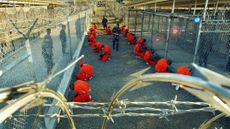Taliban seizes cities as Afghan military collapses
More than 1,000 soldiers flee across border as others hand over weapons to insurgents

CIA bosses are scrambling to bolster their counterterrorism operations in the Middle East as the clock ticks down to the total withdrawal of US troops from Afghanistan, according to insiders.
The intelligence agency “has been at the heart of the 20-year American presence in Afghanistan”, but is set to “lose bases in the country from where it has run combat missions and drone strikes while closely monitoring the Taliban and other groups such as al-Qaeda and the Islamic State”, The New York Times (NYT) reports.
Analysts have warned that reducing the CIA’s presence in the country will increase the “ever-growing risks of a Taliban takeover”, prompting “last-minute efforts to secure bases close to Afghanistan for future operations”, says the paper.
Subscribe to The Week
Escape your echo chamber. Get the facts behind the news, plus analysis from multiple perspectives.

Sign up for The Week's Free Newsletters
From our morning news briefing to a weekly Good News Newsletter, get the best of The Week delivered directly to your inbox.
From our morning news briefing to a weekly Good News Newsletter, get the best of The Week delivered directly to your inbox.
CIA director William J. Burns has publicly acknowledged the challenge faced by the agency, telling the Senate Intelligence Committee in April that “when the time comes for the US military to withdraw, the US government’s ability to collect and act on threats will diminish”.
Hours after Burns addressed the hearing on worldwide threats, Joe Biden announced that all US troops would leave Afghanistan by 11 September, rather than the 1 May deadline set by Donald Trump. But Biden has since ordered that the withdrawal be speeded up, after US allies warned of potential retaliatory attacks by the Taliban on Nato and diplomatic personnel.
US officials have emphasised “the need for a long-term intelligence-gathering presence” in the region, however, and are now locked in “thorny diplomatic negotiations'', the NYT reports. American officials and regional experts told the paper that diplomats are “exploring the option of regaining access to bases in former Soviet republics”, such as Kyrgyzstan and Uzbekistan, as a possible solution.
Biden’s defence secretary, Lloyd J. Austin, has also “had frequent calls” with the chief of the Pakistani military “about getting the country’s help for future US operations in Afghanistan”, officials “familiar with the conversations” reportedly claim.
Sign up for Today's Best Articles in your inbox
A free daily email with the biggest news stories of the day – and the best features from TheWeek.com
As the withdrawal of US and Nato forces continues, ally Australia is facing “increasing pressure” as well to “evacuate Afghan staff who have supported its diplomats and soldiers” during its military missions there, The Guardian reports.
The UK and US last week announced plans to relocate hundreds of Afghans who have worked for their militaries and governments. Under the UK’s Afghan Relocations and Assistance Policy, set up in April, hundreds more Afghans who performed roles such as acting as interpreters will be allowed to settle in Britain.
A statement released by the Taliban yesterday claimed that anyone who worked for foreign forces will be safe if they show “remorse”, Al Jazeera reports.
“They shall not be in any danger on our part… None should currently desert the country,” the statement said. “The Islamic Emirate would like to inform all the above people that they should show remorse for their past actions and must not engage in such activities in the future that amount to treason against Islam and the country.”
Despite such reassurances, “former officers who served in Afghanistan have said the threat of Taliban retribution was increasingly real”, The Guardian reports.
Retired Australian Defence Force (ADF) Major Stuart McCarthy is among the growing chorus of voices calling for his government to “step up” and help at-risk Afghan allies.
“If we don’t get them out very soon - and I’m talking in the next several weeks - many of them are going to be killed,” McCarthy told Australian media.
Joe Evans is the world news editor at TheWeek.co.uk. He joined the team in 2019 and held roles including deputy news editor and acting news editor before moving into his current position in early 2021. He is a regular panellist on The Week Unwrapped podcast, discussing politics and foreign affairs.
Before joining The Week, he worked as a freelance journalist covering the UK and Ireland for German newspapers and magazines. A series of features on Brexit and the Irish border got him nominated for the Hostwriter Prize in 2019. Prior to settling down in London, he lived and worked in Cambodia, where he ran communications for a non-governmental organisation and worked as a journalist covering Southeast Asia. He has a master’s degree in journalism from City, University of London, and before that studied English Literature at the University of Manchester.
-
 5 hilariously productive cartoons about 5 things Elon Musk did last week
5 hilariously productive cartoons about 5 things Elon Musk did last weekCartoons Artists take on proactivity, a busy week, and more
By The Week US Published
-
 Will Amazon destroy James Bond?
Will Amazon destroy James Bond?Talking Point Broccoli family yields control of franchise to tech giant, sparking fears of corporate 'Americanisation' of beloved British icon
By The Week UK Published
-
 Wine & shallot roast potatoes recipe
Wine & shallot roast potatoes recipeThe Week Recommends Crispy potatoes have a 'boat-load of flavour'
By The Week UK Published
-
 Will Iran's attack on Israel backfire?
Will Iran's attack on Israel backfire?Today's Big Question The unprecedented targeting of Israel could be a 'godsend' for Netanyahu as the limits of Tehran's military power are exposed
By Elliott Goat, The Week UK Published
-
 Will Iran risk all-out war with Israel?
Will Iran risk all-out war with Israel?Today's Big Question Tehran has not wanted to be directly involved in the Middle East conflict so far. But that could be about to change
By Chas Newkey-Burden, The Week UK Published
-
 A history of Guantánamo Bay
A history of Guantánamo BayThe Explainer War of Terror's 'symbol of torture, rendition and indefinite detention' is subject of new Serial podcast series
By The Week UK Published
-
 'Humanitarian islands': how will Israel's plan for Rafah civilians work?
'Humanitarian islands': how will Israel's plan for Rafah civilians work?Today's Big Question Designated zones in central Gaza to provide temporary housing, food and water for more than a million displaced Palestinians
By The Week UK Published
-
 How likely is an accidental nuclear incident?
How likely is an accidental nuclear incident?The Explainer Artificial intelligence, secret enemy tests or false alarms could trigger inadvertent launch or detonation
By Chas Newkey-Burden, The Week UK Published
-
 Pentagon struggles to explain Defense Secretary Lloyd Austin's secret hospitalization
Pentagon struggles to explain Defense Secretary Lloyd Austin's secret hospitalizationSpeed Read The intensely private Pentagon chief kept even President Joe Biden in the dark about his illness for 3 days
By Peter Weber, The Week US Published
-
 Israel-Hamas: what do both sides need in order to agree a sustainable ceasefire?
Israel-Hamas: what do both sides need in order to agree a sustainable ceasefire?Today's Big Question Israel and Hamas 'open' to renewed ceasefire and hostage release, as pressure mounts on Benjamin Netanyahu at home and abroad
By Elliott Goat, The Week UK Published
-
 Cluster bomb controversy hangs over Biden’s ‘chilly’ visit to UK
Cluster bomb controversy hangs over Biden’s ‘chilly’ visit to UKTalking Point US cites military ‘expediency’ but allies warn bombs could lose Ukraine the ‘moral high ground’
By The Week Staff Published